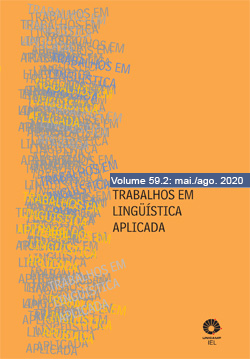Abstract
This article aims to present and discuss the concept of transmedia storytelling and to investigate, between multiliteracies and transmedia literacies, which approach is more appropriate to the production of transmedia storytelling. We begin by discussing the notion of transmedia storytelling, illustrating and situating it in the Convergence Culture. We then address the issue of literacies and of the transmedia for a Participatory Culture. Continuing our argumentation, we emphasize the pedagogy of pluralism, highlighting the perspective of multiliteracies and, particularly, the notions of design and agency. We end the article by taking a stand on the duality that then reveals itself: choosing one of the literacy views or, based on the perspective of pluralism, choosing both approaches, perceiving them as an extension, to answer the motivating questioning of this article.
References
BENKLER, Y. (2007). The wealth of networks: How social production transforms markets and freedom. Yale University Press.
CASTELLS, M. (1996). A sociedade em rede. Era da informação: economia, sociedade e cultura, trad. Roneide Venancio Majer. São Paulo: Paz e Terra, 1999, 6a. ed. vol. 1.
COPE, B.; KALANTZIS, M. (2009a) Multiliteracies: New Literacies, New Learning. Pedagogies: An International Journal, p. 164-195. Disponível em <http://newlearningonline.com/_uploads/pedagogiesm-litsarticle.pdf>. Acesso em: 12 fev. 2019.
COPE, B.; KALANTZIS, M. (2009b). New media, new learning. In: D. R. Cole e D. Pullen (Eds.), Multiliteracies in Motion: Current Theory and Practice. Londres: Routledge, 2009b, p. 87-104. Disponível em: <http://newlearningonline.com/_uploads/colenewmedianewlearningchapter.pdf>. Acesso em: 12 fev. 2019.
COPE, B.; KALANTZIS, M. (2015). The Things You Do to Know: An Introduction to the Pedagogy of Multiliteracies. In COPE, B. e KALANTZIS, M. (Ed.), A Pedagogy of Multiliteracies: Learning By Design. Londres: Palgrave, p. 1-36. Disponível em: <http://neamathisi.com/_uploads/Things_You_Do_to_Know_Cope__Kalantzis_2015.pdf>. Acesso em 12 fev. 2019.
DUDENEY, G., HOCKLY, N., PEGRUM. M. (2013). Letramentos digitais, trad. Marcos Marcionilo. São Paulo: Parábola, 2016, 1ª ed.
GALLO, P.; COELHO, M.G.P. (2011/2012). Aquisição dos letramentos necessários à cultura da convergência: a narrativa transmídia na escola. Quipus, ano 1, nº.1, p.51-62.
GRUPO DE NOVA LONDRES (1996). A Pedagogy of Multiliteracies: Designing Social Futures. Harvard Educational Review, vol. 66, n. 1, p. 1-31. Disponível em: <http://newlearningonline.com/_uploads/multiliteracies_her_vol_66_1996.pdf>. Acesso em: 12 fev. 2019.
KALANTZIS, M.; COPE, B. (2015). Learning and New Media. In: Scott, D.; Hargreaves, E. (Eds.) The Sage Handbook of Learning. Londres: Sage, p. 373-387. Disponível em: <http://neamathisi.com/_uploads/Kalantzis_and_Cope_Learning_and_New_Media_2015.pdf>. Acesso em: 12 fev. 2019.
JENKINS, H. (2006). Cultura da Convergência, trad. Susana Alexandria. São Paulo: Aleph, 2008.
JENKINS, H. (2009). What is Learning in a Participatory Culture? (Part One). Confessions of an Aca-Fan, blog Henry Jenkins, maio, s/p. Disponível em: <http://henryjenkins.org/blog/2009/05/what_is_learning_in_a_particip.html>. Acesso em: 04 abr. 2019.
JENKINS, H. (2011). Transmedia 202: Further Reflections. Confessions of an Aca-Fan, blog Henry Jenkins, julho 2011, s/p. Disponível em: <http://henryjenkins.org/blog/2011/08/defining_transmedia_further_re.html>. Acesso em: 04 abr. 2019.
LÉVY, P. (1994). A inteligência coletiva: por uma antropologia do ciberespaço. São Paulo: Loyola, 1998.
MANGUEL, A. (2001). Lendo imagens, trad. Rubens Figueiredo, Rosaura Eichenberg e Cláudia Strauch. São Paulo: Companhia das Letras.
MOITA LOPES, L.P. (Org.) (2006). Por uma Linguística Aplicada INdisciplinar. São Paulo: Parábola.
ROJO, R. (2012). Pedagogia dos multiletramentos: diversidade cultural e de linguagens na escola. In: Rojo, R.; Moura, E. (Org.) Multiletramentos na escola. São Paulo: Parábola, p. 11-31.
ROJO, R. (2013). Outras maneiras de ler o mundo. Educação no século XXI. Caderno Multiletramentos, v.3. São Paulo: Fundação Telefônica, p. 7-11. Disponível em: <http://fundacaotelefonica.org.br/wp-content/uploads/2013/03/caderno3_multiletramentos.pdf>. Acesso em: 12 fev. 2019.
SANTAELLA, L. (2018). A potência expansionista da narrativa. In: Santaella, L.; Massarolo, J.; Nesteriuk, S. (Org.), Desafios da transmídia: processos e poéticas. São Paulo: Estação das Letras e Cores, p. 66-83.
SCOLARI, C. (2013). Narrativas transmedia: cuando todos los médios cuentam. Barcelona: Centro Libros PAPF, S.L.U.
SCOLARI, C. (2016). Alfabetismo transmedia: Estrategias de aprendizaje informal y competencias mediáticas en la nueva ecología de la comunicación. Revista Telos, n. 103. Madrid: Fundación Telefónica, fev-mai. Disponível em: <https://telos.fundaciontelefonica.com/archivo/numero103/estrategias-de-aprendizaje-informal-y-competencias-mediaticas-en-la-nueva-ecologia-de-la-comunicacion/>. Acesso em 11 abr. 2019.
VAN DIJCK, J.; POELL, T.; WAAL. M. (2018). The plataforma society: Public values in a connective world. Oxford: Oxford University Press.
O periódico Trabalhos em Linguística Aplicada utiliza a licença do Creative Commons (CC), preservando assim, a integridade dos artigos em ambiente de acesso aberto, em que:
- A publicação se reserva o direito de efetuar, nos originais, alterações de ordem normativa, ortográfica e gramatical, com vistas a manter o padrão culto da língua, respeitando, porém, o estilo dos autores;
- Os originais não serão devolvidos aos autores;
- Os autores mantêm os direitos totais sobre seus trabalhos publicados na Trabalhos de Linguística Aplicada, ficando sua reimpressão total ou parcial, depósito ou republicação sujeita à indicação de primeira publicação na revista, por meio da licença CC-BY;
- Deve ser consignada a fonte de publicação original;
- As opiniões emitidas pelos autores dos artigos são de sua exclusiva responsabilidade.


